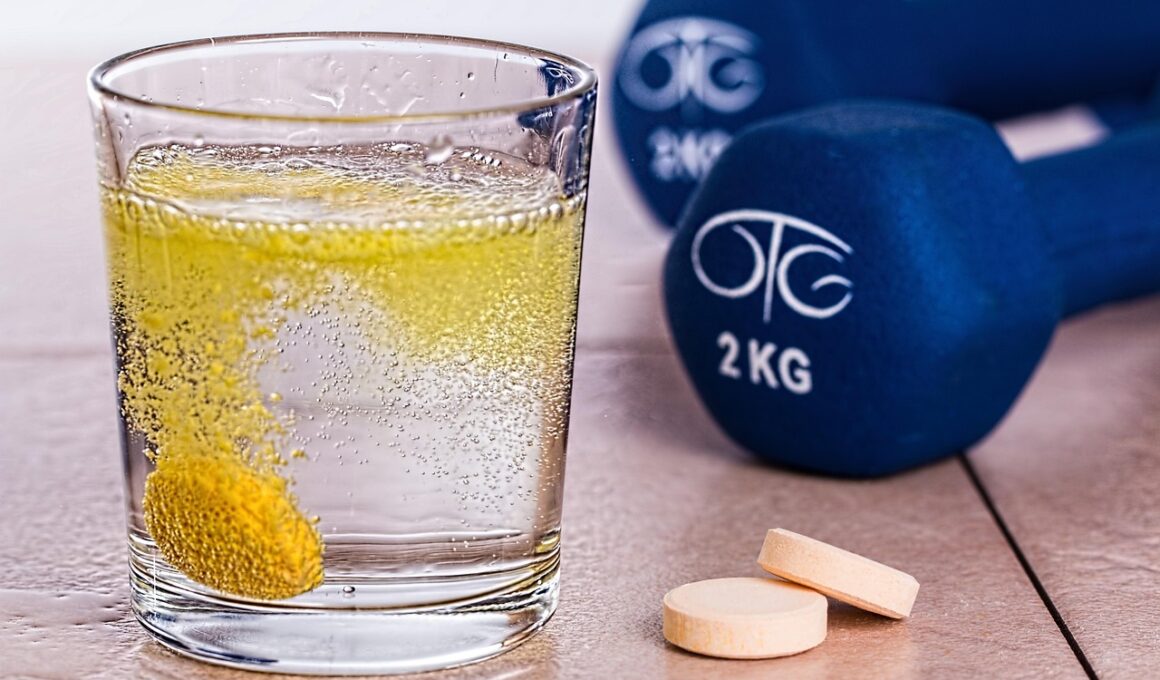Beta-Alanine Supplements and Their Effect on Exercise Capacity
Beta-alanine is an amino acid that plays a crucial role in enhancing exercise performance. It is primarily used to increase muscle carnosine levels, which helps buffer acid in muscles during intense exercise. When lactic acid builds up, it hampers performance, leading to fatigue and reduced exercise capacity. Supplementing with beta-alanine enables athletes and fitness enthusiasts to perform high-intensity workouts longer and with greater efficiency. Research indicates that using beta-alanine can significantly improve time-to-exhaustion during high-intensity efforts like sprinting or weightlifting. Additionally, this supplement is popular among various athletic populations, including runners, bodybuilders, and crossfitters. A typical dosage for effectiveness ranges from 3 to 6 grams daily and should be taken consistently. As one looks to maximize training adaptations, beta-alanine supplementation can be a beneficial tool. By delaying fatigue, it allows for more rigorous training sessions, ultimately leading to improved strength and endurance. Athletes considering this supplement should consult with a professional to tailor use according to individual needs and training regimens. Exploring the benefits and understanding the mechanism of beta-alanine is essential for any athlete aiming for performance enhancement.
In addition to performance benefits, beta-alanine has been studied extensively in various exercise modalities. Scientific research shows that supplementing with beta-alanine may result in enhanced activity in both endurance and strength training. This flexibility makes it appealing to a broad array of athletes. Studies suggest that, when combined with other supplements like creatine, the synergistic effects further enhance performance gains. Interestingly, users have reported improvements not just in their ability to push harder but also in recovery times post-exercise. The downtime between high-intensity sets is crucial, and reduced soreness can facilitate quicker returns to training. Some athletes are concerned about the potential side effects, such as tingling sensations known as paresthesia. However, this sensation is temporary and generally considered harmless. By choosing the right formulation, including sustained-release versions, athletes can minimize this side effect. Moreover, it’s essential to monitor overall intake to avoid exceeding recommended daily amounts. As athletes implement beta-alanine into their supplement routine, they should also maintain a balanced diet to optimize results and support overall performance goals effectively.
Understanding Carnosine: The Key to Performance
Carnosine is a dipeptide composed of beta-alanine and histidine, and it’s present predominantly in skeletal muscle. It acts as a buffer against the accumulation of hydrogen ions during high-intensity exercise, which helps maintain a higher pH level. As a result, carnosine can postpone the onset of muscle fatigue. Athletes with elevated levels of carnosine can sustain higher levels of performance for longer. Since our bodies naturally produce carnosine, dietary intake of beta-alanine serves as a means to elevate these levels significantly. Foods like fish and poultry are natural sources of beta-alanine, but supplementing offers a more effective way to ensure adequate levels for performance enhancement. Sustainable energy output is paramount for success in various athletic pursuits. Consequently, understanding how carnosine operates during strenuous workouts helps athletes appreciate the importance of beta-alanine supplementation. Research also shows that vegetarians and vegans may benefit particularly from supplementation, as dietary sources of beta-alanine are limited in plant-based diets. Incorporating beta-alanine could, therefore, bridge the gap for those who may not receive enough through food alone.
The timing of beta-alanine supplementation can also affect its efficacy. It is generally recommended to consume it consistently, preferably on a daily basis, to saturate muscle carnosine stores effectively. This is because the full benefits of beta-alanine are often realized over time rather than immediately post-ingestion. While some athletes opt to take it before workouts to boost performance instantly, others find that the cumulative effect proves more beneficial. For optimal results, beta-alanine can be combined with carbohydrates, which may enhance its uptake by the muscle tissues. Pre-workout blends containing beta-alanine capitalize on this timing strategy, but athletes should still consider regular daily supplementation. Hydration is equally important when supplementing with this amino acid. Maintaining hydration helps support the transportation of nutrients, including supplements like beta-alanine, throughout the body. Athletes must remember that optimal results come from a holistic approach to training, nutrition, and supplementation. Overall, understanding the nuances of how and when to take beta-alanine can significantly impact performance improvements and exercise capacity over time.
Potential Side Effects of Beta-Alanine
While beta-alanine showcases numerous performance benefits, it is vital to recognize potential side effects and individual differences in tolerability. As mentioned earlier, one of the most commonly reported side effects is paresthesia, characterized by a tingling sensation often experienced in the face, neck, or hands. Though this may be bothersome to some individuals, it’s not harmful and tends to decrease with continued use or lower doses. Furthermore, some athletes may experience gastrointestinal discomfort when first beginning supplementation. To mitigate these effects, staggering doses throughout the day or utilizing sustained-release formulations can prove advantageous. Monitoring individual responses ensures that supplementation remains an asset rather than a hindrance to training. Nevertheless, beta-alanine is generally regarded as safe when used within recommended dosages, making it an attractive option for athletes. Importantly, users are encouraged to maintain an open dialogue with healthcare providers, especially when multiple supplements are being used. As with any performance-enhancing supplement, assessing personal health factors and goals can help guide responsible use and maximization of the benefits of beta-alanine in a workout regimen.
Apart from direct performance enhancement, beta-alanine supplementation has been associated with potential long-term benefits for overall health and well-being. Some studies indicate that high levels of muscle carnosine may protect against age-related muscle decline, thereby supporting healthy aging and preserving physical function. This aspect makes beta-alanine appealing not only to competitive athletes but also to elderly individuals looking to maintain their vitality. Research shows that as individuals age, natural carnosine levels decline, which may contribute to decreased physical performance over time. Supplementation offers a proactive approach to combat this decline and sustain active lifestyles. Older adults who engage in resistance training may find that beta-alanine supplementation complements their efforts to build and maintain muscle mass. Therefore, including beta-alanine into a broader health and fitness regimen is not limited to athletes alone. Health professionals may consider advocating for its use among older populations to promote physical independence and enhance quality of life. Continuous exploration of the benefits and applications of beta-alanine across diverse age groups and fitness levels is essential.
Conclusion: Should You Try Beta-Alanine?
In summary, beta-alanine presents a promising opportunity for individuals looking to enhance their exercise capacity and overall performance. With its potential to mitigate fatigue, improve endurance, and boost strength, beta-alanine supplementation appeals to a diverse range of athletes. However, as with any supplement, individuals must consider personal circumstances, consult professionals, and evaluate their training goals. The benefits of beta-alanine come not only from its impact on short-term performance but also from potential long-term health outcomes. Weighing the pros and cons is essential to determine if beta-alanine is a suitable addition to a workout regimen. Continuous research will further illuminate the nuances of beta-alanine supplementation and its overall impact on exercise performance. For those seeking an edge in their training, beta-alanine may be the solution they need. Partnering supplementation with a well-rounded diet and exercise program ensures optimal results. Exploring options and making informed decisions will empower athletes to play an active role in maximizing their performance and enhancing their overall fitness journey.


